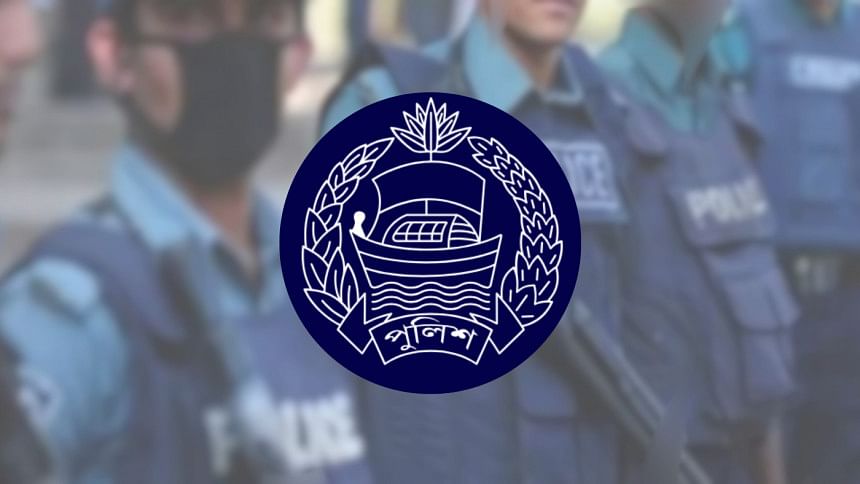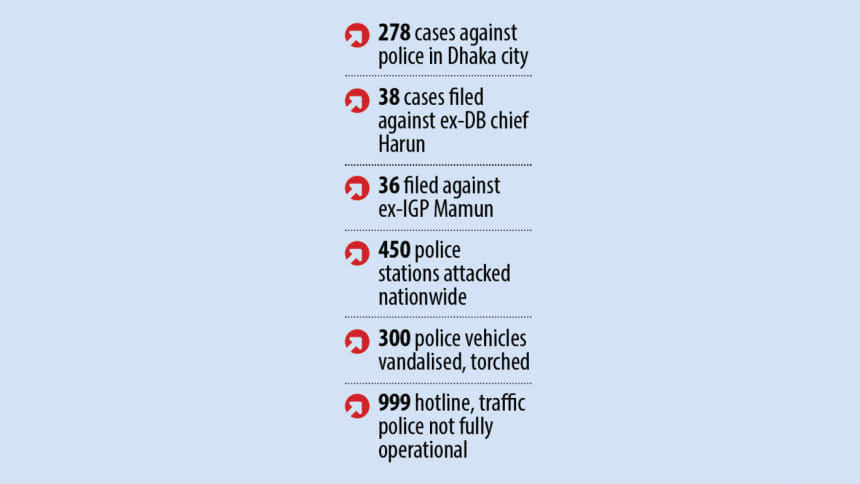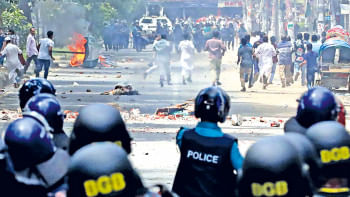Cops working, not effectively

Police have been largely absent on the ground in the one month since the fall of the Hasina-led government amid a mass uprising, causing safety concerns for the public.
Members of the force, mainly responsible for maintaining law and order, are still suffering from a serious lack of morale because of a fear of getting withdrawn, transferred, sued, and even arrested.

In the last one and a half decades, police turned into unquestioning enforcers of an increasingly authoritarian regime, and many see the police as a symbol of oppression.
Police members understand this and are afraid of public wrath. Many officers went into hiding after August 5, said top police officers.
Lt Gen (retd) Jahangir Alam Chowdhury, adviser to the home ministry, yesterday urged the superintendents of police in the districts to work sincerely with the force and logistics they have.
It is the responsibility of the police to earn the people's trust which was eroded by past irregularities and corruption.
Sources said 700-800 officers, including some cadre officers, were still absent without leave.
Before and immediately after the ouster of Hasina, police faced unprecedented public fury as mobs set their vehicles and properties on fire and ransacked police facilities in reprisal to the law enforcers' use of excessive force, including lethal weapons, on demonstrators.
According to police sources over 450 police stations out of 664 were attacked, and some of the establishments were set on fire by mobs.
As per Police Headquarters data, 5,829 firearms and 6,06,742 bullets were looted. Of those, 3,763 guns and 2,86,082 bullets were recovered while the rest are missing.
Amid this situation, the law enforcers hardly venture outside their stations when not escorted by army personnel, especially after dark. Their services have remained largely limited to registering complaints and cases. National 999 hotline resumed operations on a limited scale on August 9 and fully on August 12.
But people are not getting the police services after calling the number because the police stations do not have enough police personnel and logistic support. For a time, all the 999 calls asking for police were referred to the armed forces.
"Everything including case dockets, warrants and vehicles have been burnt at my police station. Arms and ammunition were looted. We have started patrolling on a limited scale but many of the usual activities are suspended.
"Two vehicles have been provided by Rajarbagh Police Lines. We have yet to start going out and arresting suspects," said the officer-in-charge of a police station in the capital, wishing anonymity.
Md Mainul Islam, Inspector General of Police (IGP) admitted the shortcomings.
"We never stopped policing. In some places, police stations were damaged, vandalised… [We] did not have any transport: around 300 vehicles, meant for operations, were destroyed or burnt down. Those police stations need repairs, and its vehicles replaced," he told reporters at the Secretariat.
Officers have been transferred to the areas where there were no police activities, he said. "The new SPs, range DIGs, and commissioners joined their workplaces, and now the work will speed up."
Tabarak Ullah, chief of the 999 service, said the national helpline service officials are trying to assist people with limited workforce and logistics.
Since the fall of the Awami League government, 278 cases have been filed against 94 police members in the capital. The accused include three former inspectors general of police. From constables to high-ranking officials have been accused.
Eight additional inspectors general, seven deputy inspectors general, 12 superintendents of police, 14 additional SPs, six assistant SPs, 12 OCs, eight inspectors, 10 sub-inspectors, and an assistant sub-inspector were among the accused.
Most of the cases were for murder or filed under the Explosive Substances Act, 1908, and the Arms Act, 1878.
Former DMP additional deputy commissioner Harunor Rashid, popularly known as DB Harun, is accused in the highest 38 cases, ex-IGP Chowdhury Abdullah Al-Mamun in 36 case, former DMP commissioner Habibur Rahman in 33, and former DMP joint commissioner Biplab Kumar Sarkar in 27, according to police data.
Across the country, dozens of cases were filed against police officials.
So far, 17 high-ranking police officers, including nine additional IGPs, two (supernumerary) additional IGPs , five DIGs, and an additional DIG were sent on forced retirement.
Former inspectors general of police AKM Shahidul Hoque and Chowdhury Abdullah Al-Mamun, and additional superintendent of police of Dhaka Abdullahil Kafi were arrested.
Immediately after the interim government took over, junior cops, including some cadre officials, went on work abstention demanding, among others, their security and they be not used as political tools.
Quazi Zia Uddin, deputy inspector general of the PHQ, said, "Over 99 percent of policemen re-joined the work."
A high official in the PHQ also said that over 300 cadre officials between DIG and assistant superintendent of police ranks were transferred in the last two weeks.
More than 80 of them were of SP to DIG ranks. They were attached to different police units without assigning any specific job. The number of police is around 2.13 lakh.


 For all latest news, follow The Daily Star's Google News channel.
For all latest news, follow The Daily Star's Google News channel. 




Comments